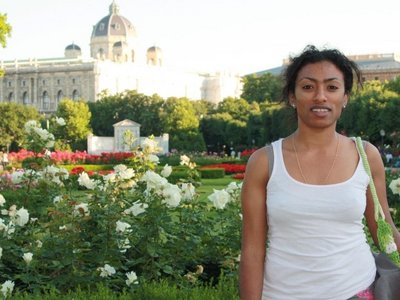

Kahsa Tadel Gebre received her PhD from the University of Natural Resources and Applied Life Sciences, BOKU, Vienna, Austria (financed by the Austrian Development Cooperation). Her doctoral research focused on dynamic systems modelling of breeding sheep populations in Ethiopia. She currently holds the position of Associate Professor at Mekelle University, where her responsibilities include teaching, research and community service.
Kahsa Tadel Gebre is currently working at the University of Natural Resources and Life Sciences (BOKU) in Vienna in the project "Capacity Building in Genomic Data Analysis and Strengthening Partnership between Institutions from South and North" (financed by the OeAD programme Cooperation Development Research). The main objective of the project is to provide advanced knowledge and skills in genomic data analysis to an animal breeding expert from Ethiopia. The project aims to estimate the different components of heterosis and inbreeding depression in African dairy cattle using genomic data. This project will be invaluable for her career development, providing her with the skills to conduct in-depth analyses of high-throughput genomic data. The project is a collaboration between BOKU-Austria and the International Livestock Research Institute (ILRI)-Kenya. In addition to building the capacity of experts from the South, the project aims to strengthen the existing partnership between BOKU, ILRI, Mekelle University and other Ethiopian institutions, foster new collaborations and generate additional funding.
Her interest in the project stems from the low productivity of indigenous livestock in developing countries due to challenges related to animal nutrition, health and genetics. In addition, a shortage of skilled personnel in genomics is hampering the development of modernised livestock breeding systems. Effective use of genomic data requires appropriate database infrastructure and support, as well as experts in quantitative genetics and statistical modelling to ensure accurate and reliable genomic analysis. Capacity building programmes in quantitative genetics, genomics and bioinformatics that provide access to scientific literature resources are crucial for scientists from developing countries involved in animal breeding. Collaboration between the North and the South, as well as among Southern countries themselves, is therefore a key element in building the capacity of animal breeding experts from the South and in designing future projects and breeding programmes.
She is actively involved in numerous nationally and internationally funded projects, both as principal investigator and co-project member. She is currently a member of the advisory boards of the LoCaBreed project in Burkina Faso and the European Master in Animal Breeding and Genetics at BOKU, from which she also graduated in 2009. These engagements contribute significantly to her expertise and excellence in her field.
Overall, her education has had a positive impact on her life, fostering growth in various aspects. Moreover, her educational journey has facilitated personal development in all areas. She extends sincere gratitude to all educators who dedicatedly imparted knowledge, enabling her to excel in her field of specialization. Additionally, she expresses gratitude to her primary supervisors, Professor Johann Sölkner, and her co-supervisors, Dr. Maria Wurzinger, Dr. Birgit Fuerst-Waltl from BOKU, and Dr. Aynalem Haile from ICARDA-Ethiopia, for their invaluable guidance, assistance, and constructive criticism throughout her educational journey. She also expresses gratitude to the EM-ABG and OeAD programs for affording her the opportunity to pursue her education at renowned universities in Europe.
In addition to better access to education and educational resources, studying in Europe. Meeting people from all over the world and learning about their unique cultures and histories was enriching. she gained a greater understanding of and appreciation for cultural differences and became proficient in respecting and navigating them.
As an associate professor at Mekelle University in Tigray, Ethiopia, it is critical for her, particularly as a woman in a developing country, to advance her career. Advancing in this way has increased her competence, opened her mind, and enabled her to be both a good mother and an advocate for diversity.
She has been collaborating with BOKU University since she finished her PhD, she was a visiting researcher at BOKU in 2016, and she has been involved in summer school teaching several times. Recently, her university became a member of Africa-UniNet, which is a good opportunity for further collaboration.
Please register here until 22 April 2024.
